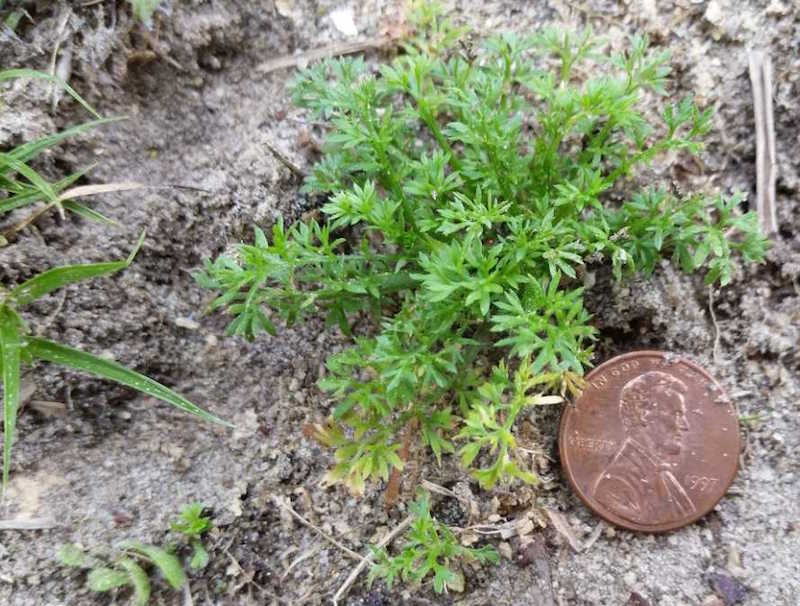Published on 01/17/23
Treat now for “stickers” in your lawn
By Alicia Holloway

Walking barefoot through soft grass is one of life’s greatest joys — the warmth of the ground, the tickling of the blades of grass on your feet, toes wriggling free from the confinement of shoes — it is just spectacular. In the summer.
In the midst of winter, after cold and rainy weeks, it sounds miserable, but if you are looking forward to that summer experience, you may want to prepare your lawn now.
Last year I had a lawn burrweed (Soliva pterosperma) emergency week. Almost everyone who called the office that week wanted to know what to do for “stickers” in the yard that were making playing barefoot in the lawn uncomfortable for kids and pets.
Unfortunately, by the time strolling barefoot becomes a joy, it is too late to control burrweed. Burrweed is a winter weed, and the “sticker” that can lodge painfully in your foot is the already-developed seed, or burr.
You can apply herbicide to the plant, but as summer begins the weed’s life cycle is ending, and once the burr is developed, it is there to pester you until next year. If you had this problem in your lawn last year, treat for burrweed now — during the first months of the year — and kill the plant before the burr develops.
University of Georgia Cooperative Extension weed scientist Patrick McCullough recommends applying a two- to three-way broadleaf mixture product formulated for controlling lawn burrweed in Bermuda grass, tall fescue and zoysia grass. Herbicide rates can be found on the product’s label and vary according to the product. Rates will also vary according to the type of grass to which the herbicide is applied. Always read and follow the instructions printed on the herbicide label.
“Available at most big-box retailers, these herbicides include Trimec Southern, Triplet and ‘Weed B Gon.’ Atrazine offers better selectivity in controlling lawn burrweed in centipede grass and Saint Augustine grass due to increased injury potential from other herbicides in the spring,” McCullough said.
Herbicides with 2,4 D or 2,4-D+MCPP+dicamba will provide good control for Bermuda, zoysia and tall fescue, but you may have to re-treat. Atrazine will provide excellent control for centipede, zoysia and dormant Bermuda. January and February are ideal times to treat burrweed.
Even if now is not the weather for sun-drenched picnics on your lawn, it is just around the corner. Take a moment to ensure your moment of barefooted bliss, undisturbed by stabbing burrs.
For more information on weed control, see UGA Extension Bulletin 978, “Weed Control in Home Lawns.”